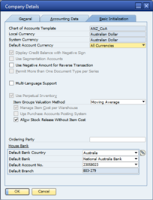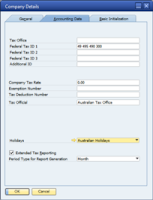Company Detail SAP B1
This time will discuss the Setting Company Detail. check this out.
Company Details
Consists of several parts, namely General, Accounting Data, Basic Initialization


Company Name :
Describes the company name, Displayed on the Main Menu on SAP Business One.
Address:
Display the address format of the field that has been filled
Address Field:
Display company address information when printing a report
Internet Address:
Explain the company's website address
Tax Office:
Entry Name of the Tax office responsible for sales and purchase taxes
Federal Tax ID 1,2,3
Tax Entry No for sales and purchase taxes (If Required)
Additional ID:
No Additional Id for the company
Company Tax Rate:
The percentage of company tax that must be deducted from the amount paid
Exemption Number
Tax Exemption Number
Tax Deduction number
This Tax Number is used to report data related to business processes, such as work locations, and company branches
Local Currency
Specifies the local currency to be used
System Currency
Manage all transactions in a currency in parallel from the System to local currency.
If defined as a system currency that is not identical to the local currency, the system currency can also be used as a report. Examples of a company that wants to report a currency system or locally. In each transaction that is inputted, it will post in a journal with both currencies.
Default Currency Account
Differentiated into 2 parts, namely Local currency and All Currency (Depending on each transaction)
Display Credit Balance with Negative Sign
to display credit balance with a negative sign (-), adjusted to the needs of each company.
Use Segmentation Account
to determine whether the account wants to be separated by segment or not for example: divisions, locations and more
Use Negative Amount For Reverse Transaction
To determine the back journal whether you want to use a minus sign on the debit credit or not
Permit More Than One Document Type per Series
Allow the same numbering of more than one document. Cannot be changed if there is a transaction
Use Perpetual inventory
Manage inventory systems perpetually
Item Group Valuation Method
The method used to control inventory. Function if using perpetual inventory. This method is divided into 3 parts, namely :
Manage Item Cost Per Warehouse
If selected, the inventory price calculation is based on the warehouseIf not selected, the inventory price calculation is based on the combination of all warehouses
Use Purchase Accounts Post System
Allows accounting for purchases based on the location of purchase. Cannot be updated if there is a transaction
Allow Stock Release Without Item Cost
Allowing exiting stock to carry out transactions without using basic prices
(Version> = 9.1) Manage Serial And Batch Cost By Item Group Valuation Method - The method of calculating the cost of moving in accordance with the Item Group
Serial / Batch Valuation Method - Method of calculating moving prices based on Batch
(Version> = 9.0) Enable Fixed Asset (If the Company wants to use Fixed assets it must be checked, because it cannot be checked if there is a transaction in SAP)
Calculate Depreciation By:
Depreciation calculations are separated Per month, Day
Enabled Multiple Branches
House Bank
The default will be used for the company bank account
Company Details
Consists of several parts, namely General, Accounting Data, Basic Initialization


Company Name :
Describes the company name, Displayed on the Main Menu on SAP Business One.
Address:
Display the address format of the field that has been filled
Address Field:
Display company address information when printing a report
Internet Address:
Explain the company's website address
Tax Office:
Entry Name of the Tax office responsible for sales and purchase taxes
Federal Tax ID 1,2,3
Tax Entry No for sales and purchase taxes (If Required)
Additional ID:
No Additional Id for the company
Company Tax Rate:
The percentage of company tax that must be deducted from the amount paid
Exemption Number
Tax Exemption Number
Tax Deduction number
This Tax Number is used to report data related to business processes, such as work locations, and company branches
Local Currency
Specifies the local currency to be used
System Currency
Manage all transactions in a currency in parallel from the System to local currency.
If defined as a system currency that is not identical to the local currency, the system currency can also be used as a report. Examples of a company that wants to report a currency system or locally. In each transaction that is inputted, it will post in a journal with both currencies.
Default Currency Account
Differentiated into 2 parts, namely Local currency and All Currency (Depending on each transaction)
Display Credit Balance with Negative Sign
to display credit balance with a negative sign (-), adjusted to the needs of each company.
Use Segmentation Account
to determine whether the account wants to be separated by segment or not for example: divisions, locations and more
Use Negative Amount For Reverse Transaction
To determine the back journal whether you want to use a minus sign on the debit credit or not
- Example If This Section Is Not Checked
 |
| http://karno-indonesia.blogspot.com |
 |
| http://karno-indonesia.blogspot.com |
- Example If this section is checked
 |
| http://karno-indonesia.blogspot.com |
 |
| http://karno-indonesia.blogspot.com |
Allow the same numbering of more than one document. Cannot be changed if there is a transaction
Use Perpetual inventory
Manage inventory systems perpetually
Item Group Valuation Method
The method used to control inventory. Function if using perpetual inventory. This method is divided into 3 parts, namely :
- Moving Average: Re-calculates the cost of goods based on receipt of goods
- Standard Price: base price based on standard prices.
- FIFO: Cost of goods based on the order of items received
Manage Item Cost Per Warehouse
If selected, the inventory price calculation is based on the warehouseIf not selected, the inventory price calculation is based on the combination of all warehouses
Use Purchase Accounts Post System
Allows accounting for purchases based on the location of purchase. Cannot be updated if there is a transaction
Allow Stock Release Without Item Cost
Allowing exiting stock to carry out transactions without using basic prices
(Version> = 9.1) Manage Serial And Batch Cost By Item Group Valuation Method - The method of calculating the cost of moving in accordance with the Item Group
Serial / Batch Valuation Method - Method of calculating moving prices based on Batch
(Version> = 9.0) Enable Fixed Asset (If the Company wants to use Fixed assets it must be checked, because it cannot be checked if there is a transaction in SAP)
Calculate Depreciation By:
Depreciation calculations are separated Per month, Day
Enabled Multiple Branches
House Bank
The default will be used for the company bank account

